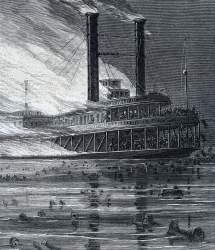Record Data
Source citation
Reproduced in Chester D. Berry, Loss of the Sultana and Reminiscences of Survivors: History of a Disaster... (Lansing, MI;Darius D. Thorp, 1892), 25-27.
Recipient (to)
Chester D. Berry
Type
Letter
Date Certainty
Exact
Transcriber
John Osborne
Transcription date
Transcription
The following text is presented here in complete form, as it originally appeared in print. Spelling and typographical errors have been preserved as in the original.
As I was chief engineer of that ill-fated steamer at the time of her explosion I thought that my recollections of that terrible calamity would be of some interest. I believe that George Cayton, one of the pilots, and myself were the only officers of the boat that escaped with our lives. Mr. Cayton, if still living, resides in St. Louis, Missouri. I have not heard of him for some time. The "Sultana" left Cairo on that fatal trip the 15th of April, 1865, the day after the death of President Lincoln, and as all wire communications with the south were cut off at that time, the "Sultana" carried the news of his assassination and death to all points and military posts on the Mississippi river as far as New Orleans. I do not remember the exact date of our leaving New Orleans on our return trip. But on our arrival at Vicksburg, we were ordered to report to carry a load of paroled soldiers, who, I believe, were from Andersonville and Libby prisons. While at Vicksburg we repaired a boiler. Now it was claimed by some at the time that this boiler was not properly repaired, and that was the cause of the explosion. In a short time those boilers were recovered and the one that had been repaired at Vicksburg was found in good condition, whole and intact, and that it was one of the other three that caused the explosion. Now what did cause this explosion? The explosion of the “ Walker R. Carter" and "Missouri," in rapid succession, I think fully answers that question. It was the manner of the construction of those boilers. After these three fatal explosions they were taken out of all steamers using them and replaced with the old style of boiler. They were an experiment on the lower Mississippi. They had been used with some success on the upper Mississippi, where the water at all times is clear and not liable to make much sediment or scale. As I said before, those boilers were an experiment on the lower Mississippi, and had not long been in use there, and it was the opinion of experts that it would have been only a question of time for all steamers using those boilers to have gone the way that the "Carter," "Missouri," and "Sultana" went, had they not have been taken out and replaced by others.
I have one word to say for the engineer who was on duty at the time and who lost his life. It was talked around that he was under the influence of liquor. I can say for him, and all who were personally acquainted with him can say the same, that he was a total abstainer from anything of the kind. I went off watch on that fatal night while the boat was lying at Memphis wharf, at eleven o’ clock in the evening of the 26th. I retired to my berth and did not know anything until I was aroused by the explosion, which occurred a few miles above Memphis, said to be about two o'clock in the morning of the 27th of April. That sight is as fresh in my memory today as it was twenty-one years ago, and I suppose to you, survivors, it is also, I stood bewildered for a moment, and then saw the river perfectly alive with human beings struggling in the water, and the cry from all quarters was “ put out the fire,” which was getting good headway by this time. But there was such a mass of confusion and such a complete wreck of the boat that nobody, apparently, could get out of the position they were in. I managed to get hold of a shutter and saw that the fire would soon force me off of the boat; I took my chances and jumped into the river. I was not in the water long until I came across a gangway plank about thirty feet long and fifteen inches wide. I abandoned my shutter for it. I was not there long until four others kept me company. There was just about enough buoyancy in the plank to keep our heads above water, and that was all. We floated in that manner for about two hours when we lodged against a snag, when one poor fellow became so benumbed with cold that he could hold no longer and sank to rise no more. In a very short time after that we were picked up by one of the relief boats that came from Memphis and were taken to the city. There was supposed to be about 2,200 people, all told, on the "Sultana" at the time, of which about one half were lost. I would like to attend the reunion if I could make it suit at the time to do so, and hear the experiences that will be given there. Hoping you may have a pleasant meeting of old friends to talk over the perils of that terrible night, and that not one of you may ever experience such another is the wish of N. Wintringer.
[This was written April 14, 1886, and he died October 11, 1886.]






